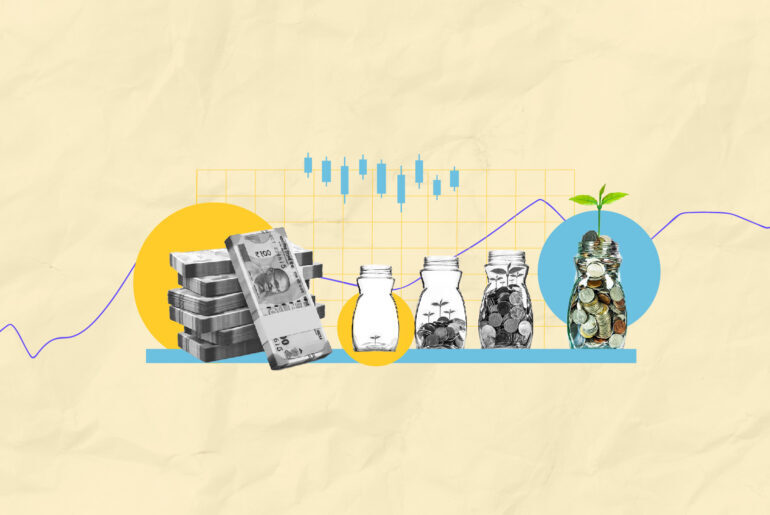Last Updated on Dec 31, 2021 by Aradhana Gotur
Phew! 2021 went by quite swiftly. With the not-so-novel-anymore coronavirus hitting the human race and economies across the globe trying to cope with the disruption, we sure lost track of time. And we are guessing so did you!
Before we finally bid 2021 a good goodbye, let’s take some time to look at the significant developments in the Indian stock market and the economy in the year. Here are the excerpts of five select editions of our weekly newsletter, Tickertalk, to remember the year by.
Table of Contents
1. Tesla’s entry clashes with EV market’s woes
Elon Musk kept his words; Tesla entered India in early 2021. While industry experts opined it would boost the government’s bold objective of achieving 30% electric mobility by 2030, everyone pinned hopes on Tesla creating ample job opportunities. The irony? In 2019, India lost 3 lakh jobs in the automotive sector, and the entry of EVs was a significant reason. Anyway, the road ahead for both Tesla and India is far from smooth. A lot has to change, and more has to get better for the Indian automotive industry to be revolutionised.
For one, India lacks battery manufacturing capabilities and infrastructure for charging points. Next, irregular and poor-quality electricity supply in the country adds to the obstacles of fully adopting electric mobility. Then, we have scarce minerals such as cobalt and lithium required to manufacture batteries. What’s more, state governments are reluctant to let go of Rs. 1.9 lakh cr. coming from the sale of fuel. To add to the woes, our high import duties on the car parts would inflate the price of Tesla cars, making them among the most expensive ones in the market.
A closer look at India’s auto market shows that it is dominated by 2-wheelers, given our growing middle-class and young population. In contrast, Tesla plans to sell Model 3 here, whose Indian variant would cost ~Rs. 70 lakh. Ironically, India’s per capita income is just about Rs. 5.6 lakh. So are we prepared to spend such a fortune on an EV? Tesla would do better if it sold affordable EVs in India with these issues at hand. Moreover, it would need its own manufacturing unit here; only then can it enjoy a return on its investments.
2. Social media apps not banned, but tension lures
So Facebook, Twitter, and WhatsApp will not be banned in India. You must be relieved, yes? But things are not in the clear as yet. In February this year, the government announced new IT rules, which would kick in starting 26th May. While failure to comply with these rules would not result in banning these platforms, they will still have consequences to face. Koo, Facebook, and Twitter agreed to abide by the new rules, but WhatsApp expressed its disappointment by suing the Indian government! But why are these social giants reluctant to comply with the new rules?
They fear that appointing local officers to address concerns puts them at risk of being pressurised by regional authorities. The new rules also require a company like WhatsApp to track down the ‘first originator’ of messages. Although the government assures that it would only need to request when the national security is threatened, or sexually explicit content is circulated, end-to-end encryption is crucial for WhatsApp’s usability since its users wish their identity to be protected.
The government also wants the platforms to monitor online content using AI, which the social giants say is complex. If WhatsApp denies giving in, it could lose its intermediary status. And if that happens, it would be held liable for third-party information and data that it hosts. As it is, things are really messy. Previously, the Indian government had dragged WhatsApp to court over its latest user privacy changes, and now WhatsApp does the same to the policymakers. Well, leaving all that behind, WhatsApp finally agreed to comply with the new rules!
3. Can share shortage lead to a price hike?
The share price of pharmaceutical company Orchid Pharma saw a meteoric rise of over 7,700%, thanks to an unfortunate shortage of shares. So what exactly does that mean? But first, a bit about how the stock ended up in this position. In 2017, Orchid Pharma was forced into bankruptcy court by Lakshmi Vilas Bank Ltd due to failure to repay a loan of about Rs. 50 cr. Three years later, Dhanuka Laboratories Ltd won Orchid’s stake. Both creditors and existing shareholders got a 1% stake in the restructuring.
The stock was re-listed in early November, after which new owners and lenders got a 99% stake in the firm. This left an average of 2,000 shares per day for trade in the market, inflating the stock price. But the new owners had to comply with a new regulation of having a minimum public float of 10% over the next few months. A similar share-price trajectory was seen in the case of Ruchi Soya Industries, Bafna Pharmaceuticals, and Alok Industries. These were bankrupt companies, too, taken over by new investors. This made SEBI rethink its regulations on minimum public shareholding (MPS).
So it decided that companies that re-list after undergoing the corporate insolvency resolution process (CIRP) should increase their public float to a minimum of 10%. They will be provided 12 mth to do so. According to some market watchers, such rallies could pose considerable risks for investors as those firms typically don’t have good fundamentals, but thanks to SEBI, the chances of these unrealistic share price surges happening have been minimised!
4. This stock grew ~50% in just one week!
With the BSE Power Index surpassing its 10-mth high in the second week of June, power stocks in the Indian markets were in for a rally. Experts attributed this to the “unlock” phases declared by various state governments, allowing commercial activities to catch pace and accelerate power consumption. Some experts also believe that the hopes of a hike in tariffs due to the rising coal prices also supported the rally.
Among others, Adani Power had exhibited a strong march in the week, zooming ~50%! Two other fundamental factors pushed the stock up. One, the company had received partial payments from the Rajasthan and Maharashtra governments that were long overdue. This could reduce the huge debt that Adani Power is staring at. The 9-mth ended FY 2021 had a total obligation of Rs. 51,341 cr. Two, vehicle buyers are shifting from fuel-run motors to electric vehicles due to the rising petrol and diesel prices.
Further, Adani Power’s investments in green energy also attracted long-term investors. Besides, investors were also delighted with the news of the cancellation of the Adani Power’s delisting as they expect a fresh delisting to take place at a higher price. While at it, are you excited about the upcoming Adani Wilmar IPO?
5. A bid to fly and grow!
On 15 September 2021, Tata Sons and Spicejet had submitted final bids for the divestment of the state-run, debt-laden Air India. Due to the pandemic, Air India’s total debt had increased dramatically over the last 2 yrs and stood at Rs. 40,000 cr as of now. Here’s the thing, the Tatas and Air India go way back.
Tata Group had started Air India in October 1932 in the name of Tata Airlines, but in 1953, the government nationalised the airline. Tata Group had planned to bring all their airline ventures under one entity to lower operating expenses by eliminating various cost structures. If the group won the bid, they would control 4,400 domestic and 1,800 international landing and parking slots at domestic airports and 900 slots at overseas airports.
Tata had also proposed to bring AirAsia India under the Air India brand. The conglomerate also had other plans in mind. Fast forward to a few days, would it have been dramatic to say that Air India was returned to the Tatas after 67 yrs of its inception? It would be and for all the right reasons!
If you haven’t subscribed to our newsletter yet, sign up to receive fresh, bite-sized content related to the stock market and the economy.
With a fair understanding of the market, calculated moves, and experience, come handsome returns. #DimaagLagana hai toh investments Mei lagao. And while doing so, keep your fears at bay kyunki #tickertapeHaiNa.
- Best Performing Index Funds in India (2025) - Jun 5, 2025
- Issue of Shares – Meaning, Types, Examples and Steps - Jun 4, 2025
- Banking Mergers in India – List of Merged PSU Banks, Advantages, and Challenges - Jun 3, 2025





